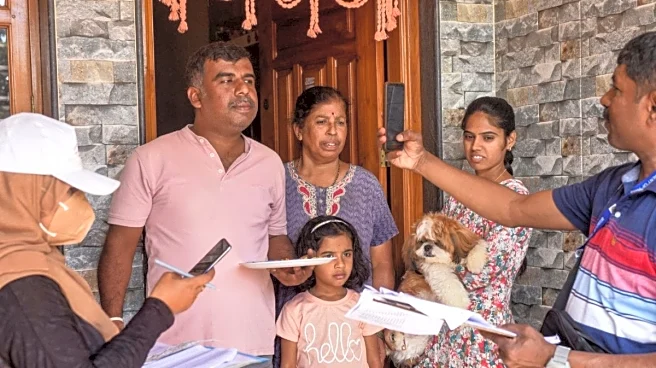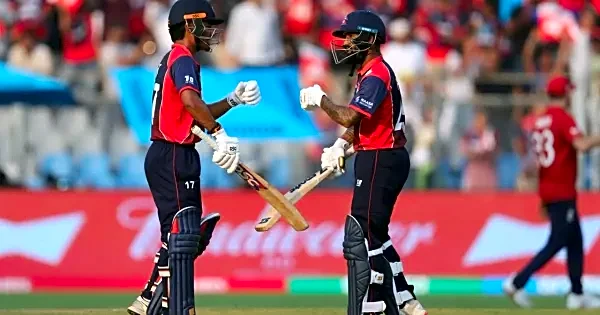The Karnataka caste census, now underway across the state, has run into a string of problems just a week after its launch in Bengaluru. From people saying they are being forced to participate in the census when they don’t want to, to teachers complaining of being overworked, the process has hit another roadblock as a section of residents refuses to cooperate. The survey includes 60 main questions and 20 sub-questions, designed by the Karnataka State Commission for Backward Classes. The socio-economic caste census is expected to provide critical data for social, educational, and political strategy in Karnataka. As the survey unfolds in Bengaluru, the state is confronted with a stark reality: implementing a large-scale, tech-driven census in a sprawling,
diverse city is far more complex than anticipated with a questionnaire that is being called “way too long”. Even Deputy Chief Minister D.K. Shivakumar, who participated in the census on the first day it was launched in Bengaluru, pulled up the officials as he found it long and tedious, asking enumerators to simplify the process. “There are too many questions. I told them to ask fewer questions. People have no patience in cities,” Shivakumar said, highlighting the challenges of conducting such a comprehensive enumeration in urban areas.
‘Emotional blackmail; too many questions’
“They came to my house, I did not want to answer. But the teacher who came insisted. I firmly said no. Now she says her salary will be reduced or action will be taken against me if I don’t complete it. It felt like emotional blackmail,” said a resident of North Bengaluru, Hebbal.
Another resident said the census was too long and complicated. While many were willing to participate, the number of questions made the process exhausting. “It would have been better to keep it simple and finish it quickly rather than run through several hours of questions,” they added.
While the state reports that 85.89% of houses have been surveyed statewide, the process in the Greater Bengaluru Authority (GBA) area is moving much slower, with only 19.62% of houses covered so far. Officials and enumerators are grappling with logistical challenges, technical glitches, and resistance from residents, casting a shadow over the state’s ambitious plan to complete the survey in 15 days.
‘Too intrusive, time-consuming’
Residents’ impatience has been evident. Many are refusing to participate, citing long wait times and a lack of clarity about why they are being surveyed. Some have complained that they are being counted in areas where they do not reside.
An HR professional from Bengaluru, Sowmya, spoke about how cumbersome the questionnairewas.
The social and educational questions, in particular, have frustrated urban residents, who feel that the survey is too intrusive and time-consuming. These challenges were compounded by teachers’ complaints about app errors, which in some cases sent them to incorrect locations or failed to display proper addresses, leaving entire households uncounted or recorded incorrectly.
“First of all, there are too many questions to answer. It would have been better if it was objective. Also, as a GC, I feel it will not help me in any way, as the focus will be on the OBCs and minorities.” She told News18.
There are also those who belong to the general category who raise the flag on privacy and the format of the questionnaire. A woman entrepreneur in the field of sustainability who did not want to be named recalls how she remembers her parents taking part in an earlier census during her childhood. “It was announced on the radio, newspapers carried every detail, and a government official showed up on the exact dates. The process was simple, systematic, and had an air of seriousness and trust. Today, that sense of trust is gone. With fraud cases on the rise, a QR code-based census feels unsafe. People aren’t aware of the official process, so they’re left to judge its authenticity on their own — and most are choosing the ‘better safe than sorry’ route,” she said.
Shivakumar has stressed that enumerators should focus on simplicity and efficiency, a reflection of his own irritation with the survey’s complexity. He said during the launch that the number of questions should have been reduced, noting that city residents are unlikely to tolerate long surveys.
‘Waste of time; why talk caste in 2025?’
Srinath, a technology professional working in one of Bengaluru’s IT clusters and a resident who rejected being part of the census, feels that what the country at this point needs is economic growth and collective civilisation. “Focusing on caste is not just a waste of time and breach of privacy, it also contributes to petty political gains,” he said.
Another resident of North Bengaluru and a global software leader professional, Dinakaran Jagdeesan, has been critical of the Karnataka caste census. “It’s astonishing that in a century where nations are debating ethical AI and climate justice, Karnataka is still busy counting people by caste. This obsession with categorising citizens by birth rather than by ability reflects a government stuck in the past — clinging to social constructs that divide rather than unite. The purpose of governance should be to erase inequality, not to institutionalise it through endless classifications. Every time we put people into boxes, we move one step further away from the idea of humanity as a single, equal community. The government must rise above political arithmetic and start seeing its citizens as people first — not as vote banks carved out by caste identity,” he told News18.
Ovais Chishti, who works as a Director, Human Resources, in a large MNC, offered a different perspective, stressing targeted support. “Although castes still exist in our country, which is a reality, and a large part of our population belongs to the lower middle class or below the poverty line, at times, it becomes imperative to carve out a definitive and targeted program for such people to uplift them and bring them to common ground. In my view, it is not about equality, but equity…one size cannot fit all,” he said.
‘This may help us’
It is the working class and those who belong to the economically backward class of society who feel this may give them a better and more fair share of the pie. “As a Lingayat, I was told to mention specifically under the category saying separate religion. I have done that. But my daughter-in-law has not mentioned it. Opinions may vary, but we want this census to reflect the real results. If people are refusing, how will we ever get justice,” asked Pallavi Shettar. She has been running her flower shop in South Bengaluru.
Teachers unhappy being enumerators
Teachers drafted as enumerators are at the centre of the friction. Many have been assigned to survey areas far from their homes, sometimes 30 to 50 kilometres away, forcing them to travel long distances and work through holidays.
Teachers’ complaints are not just about logistics; they face exhaustion and health issues, and occasionally encounter harassment from residents who question the survey’s purpose.
“This combination of technical failures, travel distances, and household resistance has made the task physically and mentally taxing. Despite assurances from GBA authorities,” said a teacher who is part of this census team. In some areas, residents refused to participate, complained about being incorrectly listed, or were outright hostile, further straining the enumerators.
Meanwhile, teachers continue to voice their grievances, demanding simpler forms, better app functionality, and more reasonable posting arrangements.
Beyond exhaustion, technical issues with the survey app are adding to frustration. Several teachers reported that the app either directed them to wrong locations or failed to load addresses when UHID numbers were entered.
Can census meet 15-day deadline?
However, concernshave been raised about whether the census can truly meet its 15-day deadline.
GBA officials are working to manage coordination across the five newly formed corporations, which has added layers of administrative oversight and slowed the survey’s progress.
The census aims to record the social, economic, educational, and political representation of every caste and community in Karnataka. This is the second state-wide caste enumeration in a decade, and the state is relying heavily on technology to ensure timely completion.
The GBA authorities have cited administrative hurdles arising from the division of BBMP into five corporations, which has required additional training for officials and led to delays in the rollout.
“We will meet the deadline,” said a confident Karnataka Backward Classes Commission official, the department coordinating the survey.
The chairperson of the GBA said the delays might extend by two to three days, or even a week, but assured that the census would be completed within the timeline.
Despite these issues, the survey continues across Bengaluru. On the seventh day of the GBA census, 1.47 lakh houses were reportedly surveyed in a single day, bringing the total number of houses surveyed in the city so far to 9.15 lakh. Central City Corporation has recorded 19,330 houses, East City 22,124, North City 35,244, South City 27,713, and West City 42,958. The survey in the city is expected to cost the state exchequer around Rs 625 crore.





/images/ppid_a911dc6a-image-177079842407186179.webp)







/images/ppid_a911dc6a-image-177079802683499657.webp)
/images/ppid_59c68470-image-177079756041760388.webp)

/images/ppid_59c68470-image-177079752900923983.webp)
/images/ppid_59c68470-image-177079752787481340.webp)
